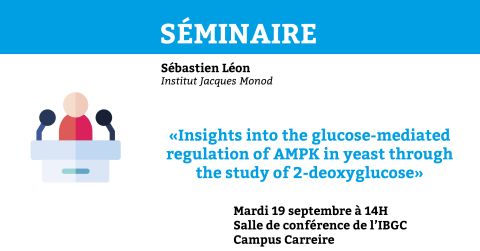"Insights into the glucose-mediated regulation of AMPK in yeast through the study of 2-deoxyglucose resistance mechanisms"
Glucose is a common energy source for most organisms. It acts both as a nutrient and a signaling molecule, and its presence and metabolism can regulate a plethora of signaling pathways. This is particularly true in the yeast Saccharomyces cerevisiae which has evolved a specific connection with glucose. A dedicated signaling pathway ensures the preferential use of glucose through the repression of genes in charge of the metabolism of other carbon sources. This glucose-mediated repression pathway is mainly controlled by the yeast 5’-AMP activated kinase (AMPK) orthologue, Snf1. A central actor of Snf1 regulation is a Protein Phosphatase 1 (PP1) complex, Glc7/Reg1, which can dephosphorylate and thus inhibit AMPK activity when glucose is present. Despite decades of research in this fundamental pathway and its economical importance for many biotechnological processes, how glucose is sensed to regulate AMPK activity remains elusive. We used the toxic glucose analogue 2-deoxyglucose (2DG) to gain insights into glucose signaling. We isolated spontaneous mutants resistant to this drug and through a combination of classical genetic analysis and whole genome resequencing, we identified several mechanisms which may give us insights into the toxicity of this drug and how glucose regulates AMPK signaling.
Relevant publications to this topic
* C. Laussel, V. Albanese, F. J. Garcia-Rodriguez, A. Ballin, Q. Defenouillere and S. Leon (2022) 2-deoxyglucose transiently inhibits yeast AMPK signaling and triggers glucose transporter endocytosis, potentiating the drug toxicity. PLoS Genet 18:e1010169 DOI: 10.1371/journal.pgen.1010169
* C. Laussel and S. Leon (2020) Cellular toxicity of the metabolic inhibitor 2-deoxyglucose and associated resistance mechanisms. Biochem Pharmacol 182:114213. DOI: 10.1016/j.bcp.2020.114213
* Q. Defenouillėre, A. Verraes, C. Laussel, A. Friedrich, J. Schacherer and S. Leon (2019) The induction of HAD-like phosphatases by multiple signaling pathways confers resistance to the metabolic inhibitor 2-deoxyglucose. Science Signaling 12:eaaw8000. doi: 10.1126/scisignal.aaw8000.


